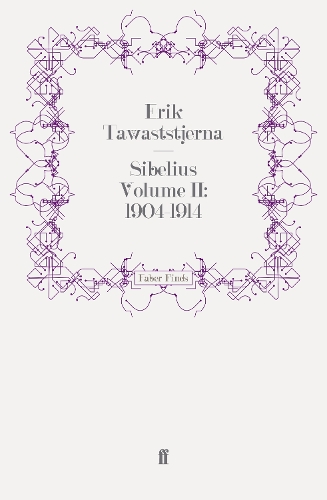
Sibelius Volume II: 1904-1914
(Paperback, Main)
Available Formats
Publishing Details
Sibelius Volume II: 1904-1914
By (Author) Erik Tawaststjerna
Translated by Robert Layton
Faber & Faber
Faber & Faber
11th December 2008
Main
United Kingdom
Classifications
General
Non Fiction
Composers and songwriters
Art music, orchestral and formal music
780.92
Physical Properties
Paperback
318
Width 153mm, Height 234mm, Spine 23mm
476g
Description
Erik Tawaststjerna embarked on his monumental and acclaimed study of Jean Sibeliuss life and music in 1960 and it occupied him for over a quarter of a century. His study differs from other work on the composer in one important respect: he had unrestricted access to the composers papers, diaries and letters as well as the advantage of numerous conversations with the composers widow and other members of the family. Thus his researches can justifiably claim to have thrown entirely fresh light on the great Finnish composer. Far from the remote personality of the Sibelius legend, Sibelius emerges as a highly colourful figure. This second volume covers the crucial period from 1904 and the beginning of the Third Symphony through to the outbreak of the First World War ten years later. During this period Sibelius began keeping a diary which, together with his letters to his wife, Aino, and to his friend, Axel Carpelan, helped the author give us a day-by-day, intimate account of the turbulent years that saw the gestation and completion of many of his finest works, culminating in the Fourth Symphony. Translated by Robert Layton, himself a Sibelius specialist, this is a compelling and insightful account of the music of one of the twentieth centurys greatest composers.
Author Bio
Erik Tawaststjerna (1916-93) devoted a lifetime to the study of Sibelius, and came to know him personally. After Sibelius's death in l957 he was given unrestricted access to the composer's papers. Tawaststjerna's three-volume study of Sibelius was awarded the prestigious Finlandia Prize and has been hailed as definitive. Robert Layton was the Music Talks Producer for the BBC Third Programme and then Radio 3, and is the author of the standard English study of Sibelius in the Master Musicians series He was awarded the Finnish State Literary Prize in l985 for his translation of the first two volumes of Tawaststjerna's Sibelius, and was subsequently made a Knight of the Order of the White Rose of Finland for his work on the composer
